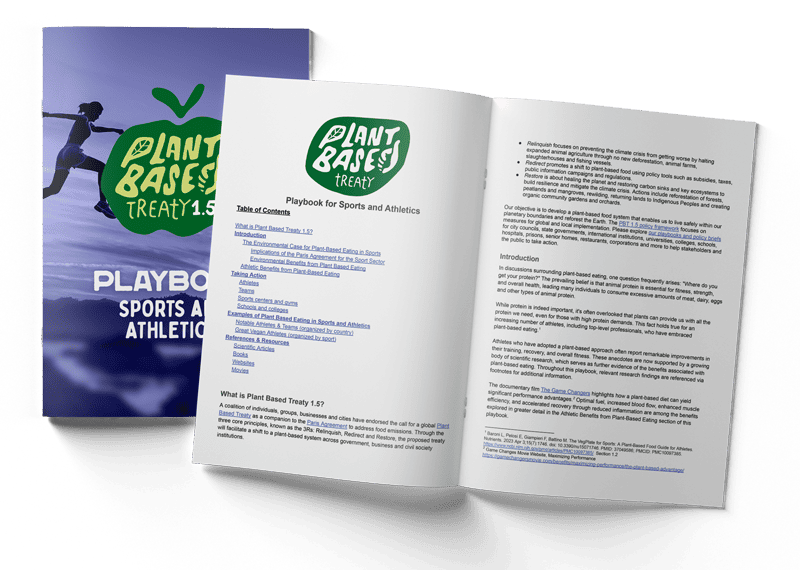Blog
5 Key Takeaways From The Plant Based Treaty Playbook For Sports And Athletics
March 28, 2024

The power of plants is strong, just like the vegan athletes around the world proving we don’t need animal products to build muscle, remain healthy, and compete professionally. The Plant Based Treaty’s Playbook aims to normalize plant-based eating within sports and athletics and encourages athletes, teams, sports organizations, gyms, and educational institutions to transition to plant-based diets for environmental sustainability, performance, and health.
The Sports and Athletics Playbook, written by Canadian triathlete Jason Fonger, details the impact of nutrition on athletic performance, the importance of normalizing plant-based eating in sports, and highlights inspiring vegan athletes and teams. It’s a valuable resource for athletes and institutions to spread the vegan message and lead the way to a greener world.
1. Impact Of Nutrition On Athletic Performance

When athletes follow a plant-based diet they are providing their body with optimal fuel it needs to complete and gaining multiple health benefits to improve performance. During strenuous physical activity, the main source of energy for our muscles and brain comes from carbohydrates found mainly in whole plant foods. Plant foods rich in nitrates like green leafy vegetables such as spinach and lettuce, help open blood vessels and enhance blood flow, crucial for delivering oxygen and nutrients to muscles and organs. This is a huge benefit to athletes as it translates to a better overall performance as the compounds in nitrate-rich foods allow muscles to contract more effectively.
Another positive impact is reduced inflammation since plant diets are rich in anti-inflammatory compounds and antioxidants, but animal-based foods promote the creation of pro-inflammatory compounds. Eating more plants and less animal products helps athletes decrease soreness and supports a faster recovery from injuries and workouts. So skip the meat and dairy and opt for a meal rich in nitrates and packed with whole plant foods and you’ll be smiling all the way to the finish line.
2. Vegan Teams for the Win

Photograph: Javier García/Rex/Shutterstock
There are many notable and inspiring vegan athletes making a positive difference for animals, our earth, and their health. But an entire plant-based sports team? Imagine the impact a whole team can have! The Forest Green Rovers, a football team in Gloucestershire, England, is leading the way to a kinder and more sustainable world.
“We might be known for being the only vegan football club in the world but it goes much deeper than that, we’re continually looking at new ways to push the boundaries of environmental consciousness in sport and that’s why FIFA described us in 2017 as the greenest football club in the world.”
The Rovers started their vegan journey in 2010 and became the world’s first carbon neutral football club, setting an example for others to follow in their green footsteps. They have introduced many sustainability measures, including solar panels, electric car charging points, water recycling, an electric lawnmower, an organic pitch, and an entirely vegan menu for players and fans, as outlined in this video.
3. Normalizing Plant Based Eating In Sports
This playbook aims to normalize plant-based eating within sports and athletics and bust myths. Vegan athletes in nearly every sport continuously prove they don’t need protein from animal products to gain muscle and strength. Athletes powered by plants are leading by example and showcasing these benefits when it comes to their overall performance, recovery, and well-being. Many are vocal on social media and on their websites about their athletic journey, which inspires others. (While other athletes may choose to become a walking billboard and wear the coolest gear in town!) Athletes can advocate for more plant-based menu options at training centers and on-site cafeterias by encouraging their facilities to provide meals, snacks, and drinks without animal products and providing certain vegan items like oat milk by default. Arranging screenings of films and documentary series such as The Game Changers and You Are What You Eat also helps normalize plant-based eating in sports.
4. Education And Awareness

If teammates are unfamiliar with how delicious and nutritious vegan food is, athletes can share recipe ideas for the big game and whole food plant-based meal ideas to get them started. Engaging in community events focused on plant-based eating and healthy living and encouraging fellow athletes to join is a great way to raise awareness. Other ideas include speaking at wellness or health conferences about vegan food, hosting cooking demonstrations, participating in relevant campaigns, volunteering at food drives, and of course, encouraging teammates to endorse the Plant Based Treaty! Social media is also helpful, and athletes can endorse organizations and brands that promote healthy food, sustainability, and animal rights. Joining a vigil and bearing witness to animals could be done as a group to inspire positive change and educate others.
5. Resources For Sports Centers, Gyms, And Schools

The playbook provides sports centers simple yet crucial ideas they can implement, such as adding plant-based options to cafeterias and vending machines and eliminating animal products. They can exhibit posters encouraging healthy eating and the benefits of plant-based nutrition on athletic performance and health. Trainers and staff can play a key role in encouraging gym members if they are properly trained in nutrition and health. This helps create a supportive environment and community within the fitness center where people can share recipes and find information.
When it comes to schools, colleges, and universities, they can provide educational resources through the curriculum and student groups encouraging student athletes to go plant-based. Student clubs such as the one started by Yarim Hinojosa, a student at the University of Toronto, is a great example. Hinojosa campaigns for vegan options and increases visibility by starting important dialogues with staff, students and Chefs about plant-based food. The same can be done at clubs for student athletes. Cafeterias on campus can transition to plant-based meals and offer some vegan items by default. Workshops and seminars can be held on campus focusing on nutrition for athletes.
Overall, the Playbook for Sports and Athletics, is a must-read document for athletes and institutions.

Miriam Porter is an award-winning writer who writes about veganism, social justice issues, and eco-travel. Miriam currently lives in Toronto with her son Noah and many rescued furry friends. She is a passionate animal rights activist and speaks up for those whose voices cannot be heard.
More from the blog
6 Important Calls To Action From The Safe And Just Report – Part One
By Miriam Porter
Grow Your Own Kale And Spinach For Healthy Green Smoothies
By Miriam Porter
The Importance Of Exercise And Tips On Building Muscle
By Miriam Porter



